 W
WThe Italian Social Republic, popularly and historically known as the Republic of Salò, was a German puppet state with limited recognition that was created during the later part of World War II, and existing from the beginning of German occupation of Italy in September 1943 until the surrender of German troops in Italy in May 1945. During the civil war, which split the country in two, it fought against the Italian Resistance.
 W
WThe National Republican Air Force was the air force of the Italian Social Republic during World War II, closely linked with the German Air Force (Luftwaffe) in northern Italy.
 W
WTito Agosti was an officer in the Royal Italian Army during the Italo-Turkish War, World War I, the Second Italo-Ethiopian War and World War II, and a general in the Army of the Italian Social Republic.
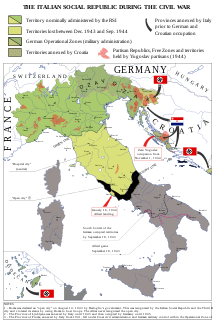 W
WTwo of the three Axis powers of World War II—Nazi Germany and their Fascist Italian allies—committed war crimes in the Kingdom of Italy.
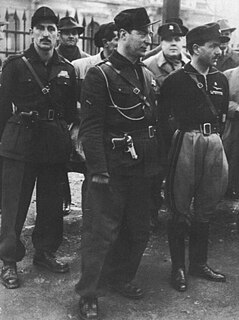 W
WThe Corpo Ausiliario delle Squadre d'azione di Camicie Nere, most widely known as the Black Brigades, was one of the Fascist paramilitary groups, organized and run by the Republican Fascist Party operating in the Italian Social Republic, during the final years of World War II, and after the signing of the Italian Armistice in 1943. They were officially led by Alessandro Pavolini, former Minister of Culture of the fascist era during the last years of the Kingdom of Italy.
 W
WDuce is an Italian title, derived from the Latin word dux "leader", and a cognate of duke. National Fascist Party leader Benito Mussolini was identified by Fascists as Il Duce of the movement since the birth of the Fasci Italiani di Combattimento in 1919. In 1925 it became a reference to the dictatorial position of Sua Eccellenza Benito Mussolini, Capo del Governo, Duce del Fascismo e Fondatore dell'Impero. Mussolini held this title together with that of President of the Council of Ministers: this was the constitutional position which entitled him to rule Italy on behalf of the King of Italy. Founder of the Empire was added for the exclusive use by Mussolini in recognition of his founding of an official legal entity of the Italian Empire on behalf of the King in 1936 following Italy's victory in the Second Italo-Ethiopian War. The position was held by Mussolini until 1943, when he was removed from office by the King and the position of "Duce" was dismantled, while Marshal Pietro Badoglio, 1st Duke of Addis Abeba was appointed Presidente del Consiglio.
 W
WThe expatriate American poet Ezra Pound recorded or composed hundreds of broadcasts in support of fascism for Italian radio during World War II and the Holocaust in Italy. Based in Italy since 1924, Pound collaborated with the fascist regime of Benito Mussolini and expressed support for Adolf Hitler. Written at first for EIAR, and later for a new radio station in the Salò Republic, a Nazi puppet state in northern Italy, the broadcasts contained deeply antisemitic and racist material. They were transmitted to England, central Europe, and the United States, mostly in English, but also in Italian, German, and French.
 W
WThe Gran Sasso raid was the rescue of the Italian Fascist dictator Benito Mussolini from the Gran Sasso d'Italia massif by German paratroopers and Waffen-SS commandos in September 1943, during World War II. The airborne operation was personally ordered by Adolf Hitler, approved by General Kurt Student and planned and executed by Major Harald Mors.
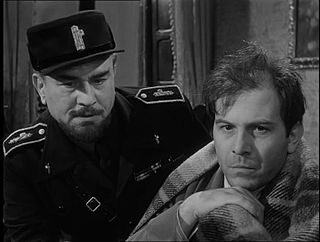 W
WLong Night in 1943 is an Italian film of 1960 set in Ferrara, in the Italian Social Republic Nazi puppet state during the late stages of WW2. It was directed by Florestano Vancini and adapted by Vancini, Ennio De Concini and Pier Paolo Pasolini from a short story by Giorgio Bassani. The film stars Enrico Maria Salerno, Gino Cervi, Belinda Lee, Gabriele Ferzetti and Andrea Checchi.
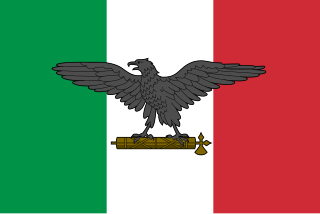 W
WThe Marina Nazionale Repubblicana was the navy of the Italian Social Republic, a German puppet state in Italy.
 W
WThe National Republican Army was the army of the Italian Social Republic from 1943 to 1945 that fought on the side of Nazi Germany during World War II.
 W
WThe Italian National Republican Guard was a gendarmerie force of the Italian Social Republic created by decree on December 8, 1943, replacing the Carabinieri and the National Security Volunteer Militia (MVSN). General Renato Ricci appointed as its commandant. Major General Italo Romegialli was appointed vice commandant and Major General Nicolò Nicchiarelli became the chief of general staff.
 W
WEnea Navarini was an Italian general who served during the Second World War from 1940 to 1943.
 W
WThe Operational Zone of the Adriatic Littoral was a Nazi German district on the northern Adriatic coast created during World War II in 1943. It was formed out of territories that were previously under Fascist Italian control until its takeover by Germany. It included parts of present-day Italian, Slovenian, and Croatian territories. The area was administered as territory attached, but not incorporated to, the Reichsgau of Carinthia. The capital of the zone was the city of Trieste.
 W
WThe Operational Zone of the Alpine Foothills was a Nazi German occupation zone in the sub-Alpine area in Italy during World War II.
 W
WThe propaganda used by the National Fascist Party (PNF) in the years leading up to and during Benito Mussolini's leadership of Italy (1922–1943) was a crucial instrument for acquiring and maintaining power, and for the implementation of Fascist policies.
 W
WThe Province of Carnaro was a province of the Kingdom of Italy from 1924 to 1943, then under control of the Italian Social Republic and German Wehrmacht from 1943 to 1945. It took its official name after the Gulf of Carnaro.
 W
WThe Republican Fascist Party was a political party in Italy led by Benito Mussolini during the German occupation of Central and Northern Italy and was the sole legal and ruling party of the Italian Social Republic. It was founded as the successor to the National Fascist Party while incorporating anti-monarchism, as they considered King Victor Emmanuel III to be a traitor after his signing of the surrender to the Allies.
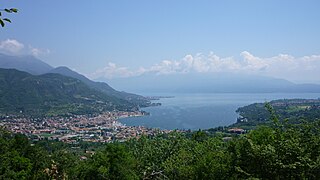 W
WSalò is a town and comune in the Province of Brescia in the region of Lombardy on the banks of Lake Garda, on which it has the longest promenade. The city was the seat of government of the Italian Social Republic from 1943 to 1945, with the ISR often being referred to as the "Salò Republic".
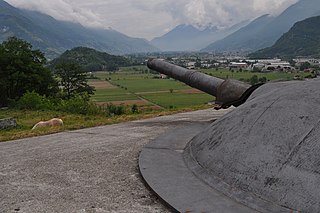 W
WThe Valtellina Redoubt or, officially, in Italian, Ridotto Alpino Repubblicano or RAR, was the intended final stronghold or redoubt of the Italian fascist regime of Benito Mussolini at the end of World War II. It was to be based in the Valtellina, a valley in the Italian Alps, which had the natural protection afforded by the surrounding mountains as well as the possibility of re-using fortifications built in the area for World War I. The idea was initially proposed in September 1944 by Alessandro Pavolini, one of the fascist leaders, who saw it as the place for the regime to make a "heroic" last stand which would inspire a future fascist revolution.
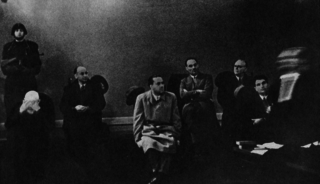 W
WThe Verona Trial was a show trial held in January 1944 in the Italian Social Republic (ISR) to punish—by five almost-immediately executed death sentences and one 30-year imprisonment—the members of the Grand Council of Fascism who had committed the offence of voting for Benito Mussolini's removal from power in the Kingdom of Italy and had later been arrested by Mussolini's forces.